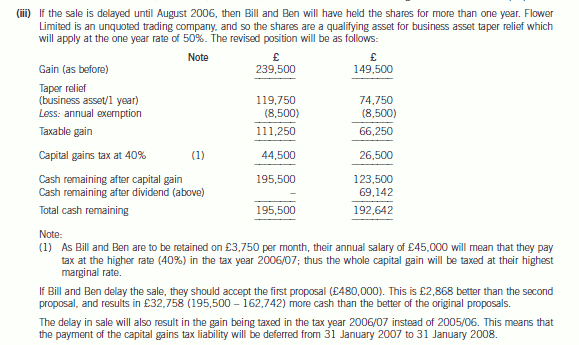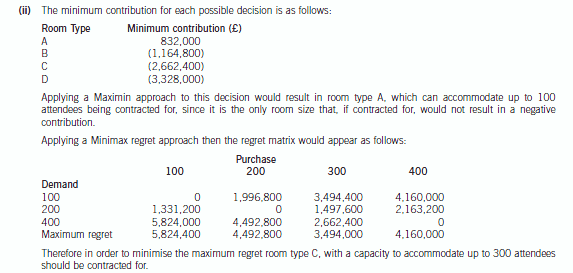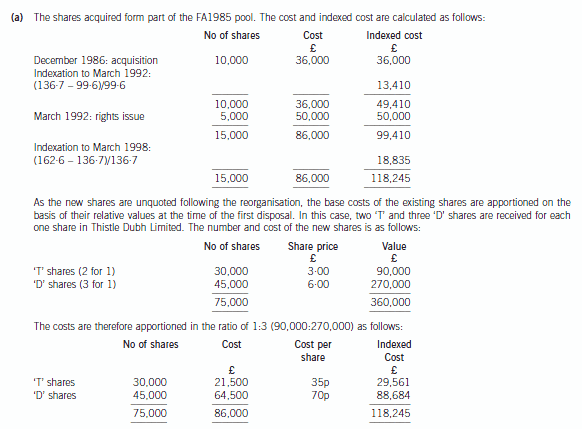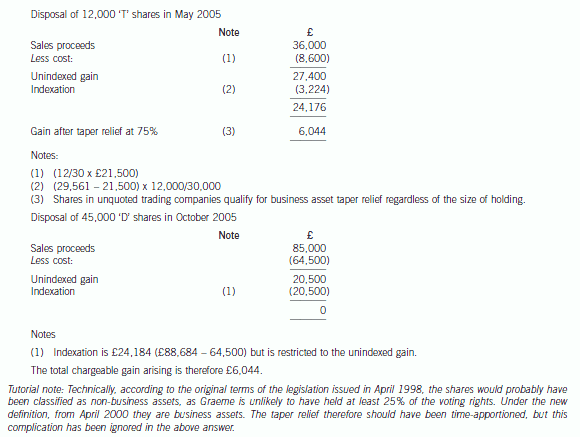重磅!2021年ACCA考情分析!
发布时间:2021-06-19
相信2021年也有很多小伙伴报名了acca考试,为了帮助大家更好的备考学习,顺利通过考试,今天51题库考试学习网给大家分享一下2021年acca考情分析。
Acca是(特许公认会计师公会Association of Chartered Certified Accountants),是全球最具规模的国际专业会计师组织,为全世界有志于投身财务、会计以及管理领域的专业人才提供资格认证。一共有15科,但需要考试的科目是13科。
今天主要来给大家简单介绍一下基础阶段知识课程这三门科目考察的方式以及主要内容。
F1(会计师与企业),主要是给学员建立商业背景,内容包含企业组织,公司管理,会计报告体系,内部财务控制,人力资源管理以及会计职业道德这几方面的内容,F1主要是为后续专业阶段科目打基础。考试采用机考方式,考试时间2个小时,分为A、B两个部分,A部分考察的是单选题型,一共76分,而B部分是以情景为基础考察的多任务题型(结合单选、多选以及判断共同组成)。
F2(管理会计),主要阐述管理会计如何在企业决策当中发挥作用的,包括管理会计,管理信息,成本会计以及预算和标准成本等内容,为后续的F5(业绩管理)以及P5(高级业绩管理)打基础。考试依然采用机考方式,为时2个小时,分为A、B两个部分,A部分主要考察单选题型,一共70分,而B部分则是多任务题型(由计算、简答和论述题构成),分值高达30分,各位考生一定要重视起来。
F3(财务会计),介绍财务会计准则以及相关考会计科目建立等信息。帮助学员们可以更好的解读后续F7(财务报告)和P2(公司报告)。考试形式采用机考,2个小时,分为A、B两个部分,A部分35道题,单选题70分,B部分多任务题30分(由单选、计算、编辑报表类题构成)。
Acca考试学科很多,是为了帮助学员建立比较完整的商业背景,及储备所需的专业知识。不单单是考试,在职场中我们也要多做准备,充分武装自己,才能打赢胜仗。
以上就是51题库考试学习网分享的全部内容,希望能够帮助到大家!准备参加2021年acca的考生,一定要认真备考,争取早日拿下证书。还想了解更多考试相关信息,可持续关注51题库考试学习网。
下面小编为大家准备了 ACCA考试 的相关考题,供大家学习参考。
(iii) State how your answer in (ii) would differ if the sale were to be delayed until August 2006. (3 marks)

(ii) Determine whether your decision in (b)(i) would change if you were to use the Maximin and Minimax
regret decision criteria. Your answer should be supported by relevant workings. (6 marks)

3 Mary Hobbes joined the board of Rosh and Company, a large retailer, as finance director earlier this year. Whilst she
was glad to have finally been given the chance to become finance director after several years as a financial
accountant, she also quickly realised that the new appointment would offer her a lot of challenges. In the first board
meeting, she realised that not only was she the only woman but she was also the youngest by many years.
Rosh was established almost 100 years ago. Members of the Rosh family have occupied senior board positions since
the outset and even after the company’s flotation 20 years ago a member of the Rosh family has either been executive
chairman or chief executive. The current longstanding chairman, Timothy Rosh, has already prepared his slightly
younger brother, Geoffrey (also a longstanding member of the board) to succeed him in two years’ time when he plans
to retire. The Rosh family, who still own 40% of the shares, consider it their right to occupy the most senior positions
in the company so have never been very active in external recruitment. They only appointed Mary because they felt
they needed a qualified accountant on the board to deal with changes in international financial reporting standards.
Several former executive members have been recruited as non-executives immediately after they retired from full-time
service. A recent death, however, has reduced the number of non-executive directors to two. These sit alongside an
executive board of seven that, apart from Mary, have all been in post for over ten years.
Mary noted that board meetings very rarely contain any significant discussion of strategy and never involve any debate
or disagreement. When she asked why this was, she was told that the directors had all known each other for so long
that they knew how each other thought. All of the other directors came from similar backgrounds, she was told, and
had worked for the company for so long that they all knew what was ‘best’ for the company in any given situation.
Mary observed that notes on strategy were not presented at board meetings and she asked Timothy Rosh whether the
existing board was fully equipped to formulate strategy in the changing world of retailing. She did not receive a reply.
Required:
(a) Explain ‘agency’ in the context of corporate governance and criticise the governance arrangements of Rosh
and Company. (12 marks)
(a) Defining and explaining agency
Agency is defined in relation to a principal. A principal appoints an agent to act on his or her behalf. In the case of corporate
governance, the principal is a shareholder in a joint stock company and the agents (that have an agency relationship with
principals) are the directors. The directors remain accountable to the principals for the stewardship of their investment in the
company. In the case of Rosh, 60% of the shares are owned by shareholders external to the Rosh family and the board has
agency responsibility to those shareholders.
Criticisms of Rosh’s CG arrangements
The corporate governance arrangements at Rosh and Company are far from ideal. Five points can be made based on the
evidence in the case.
There are several issues associated with the non-executive directors (NEDs) at Rosh. It is doubtful whether two NEDs are
enough to bring sufficient scrutiny to the executive board. Some corporate governance codes require half of the board of larger
companies to be non-executive and Rosh would clearly be in breach of such a requirement. Perhaps of equal concern, there
is significant doubt over the independence of the current NEDs as they were recruited from retired executive members of the
board and presumably have relationships with existing executives going back many years. Some corporate governance codes
(such as the UK Combined Code) specify that NEDs should not have worked for the company within the last five years. Again,
Rosh would be in breach of this provision.
Succession planning for senior positions in the company seems to be based on Rosh family membership rather than any
meritocratic approach to appointments (there doesn’t appear to be a nominations committee). Whilst this may have been
acceptable before the flotation when the Rosh family owned all of the shares, the flotation introduced an important need for
external scrutiny of this arrangement. The lack of NED independence makes this difficult.
There is a poor (very narrow) diversity of backgrounds among board members. Whilst diversity can bring increased conflict,
it is generally assumed that it can also stimulate discussion and debate that is often helpful.
There is a somewhat entrenched executive board and Mary is the first new appointment to the board in many years (and is
the first woman). Whilst experience is very important on a board, the appointment of new members, in addition to seeding
the board with talent for the future, can also bring fresh ideas and helpful scrutiny of existing policies.
There is no discussion of strategy and there is evidence of a lack of preparation of strategic notes to the board. The assumption
seems to be that the ‘best’ option is obvious and so there is no need for discussion and debate. Procedures for preparing
briefing notes on strategy for board meetings appear to be absent. Most corporate governance codes place the discussion and
setting of strategy as a high priority for boards and Rosh would be in breach of such a provision.
There is no evidence of training for Mary to facilitate her introduction into the organisation and its systems. Thorough training
of new members and ongoing professional development of existing members is an important component of good governance.
2 Graeme, aged 57, is married to Catherine, aged 58. They work as medical consultants, and both are higher rate
taxpayers. Barry, their son, is aged 32. Graeme, Catherine and Barry are all UK resident, ordinarily resident and
domiciled. Graeme has come to you for some tax advice.
Graeme has invested in shares for some time, in particular shares in Thistle Dubh Limited. He informs you of the
following transactions in Thistle Dubh Limited shares:
(i) In December 1986, on the death of his grandmother, he inherited 10,000 £1 ordinary shares in Thistle Dubh
Limited, an unquoted UK trading company providing food supplies for sporting events. The probate value of the
shares was 360p per share.
(ii) In March 1992, he took up a rights issue, buying one share for every two held. The price paid for the rights
shares was £10 per share.
(iii) In October 1999, the company underwent a reorganisation, and the ordinary shares were split into two new
classes of ordinary share – ‘T’ shares and ‘D’ shares, each with differing rights. Graeme received two ‘T’ and three
‘D’ shares for each original Thistle Dubh Limited share held. The market values for the ‘T’ shares and the ‘D’
shares on the date of reorganisation were 135p and 405p per share respectively.
(iv) On 1 May 2005, Graeme sold 12,000 ‘T’ shares. The market values for the ‘T’ shares and the ‘D’ shares on that
day were 300p and 600p per share respectively.
(v) In October 2005, Graeme sold all of his ‘D’ shares for £85,000.
(vi) The current market value of ‘T’ shares is 384p per share. The shares remain unquoted.
Graeme and Catherine have owned a holiday cottage in a remote part of the UK for many years. In recent years, they
have used the property infrequently, as they have taken their holidays abroad and the cottage has been let out as
furnished holiday accommodation.
Graeme and Catherine are now considering selling the UK country cottage and purchasing a holiday villa abroad.
Initially they plan to let this villa out on a furnished basis, but following their anticipated retirement, would expect to
occupy the property for a significant part of the year themselves, possibly moving to live in the villa permanently.
Required:
(a) Calculate the total chargeable gains arising on Graeme’s disposals of ‘T’ and ‘D’ ordinary shares in May and
October 2005 respectively. (7 marks)


声明:本文内容由互联网用户自发贡献自行上传,本网站不拥有所有权,未作人工编辑处理,也不承担相关法律责任。如果您发现有涉嫌版权的内容,欢迎发送邮件至:contact@51tk.com 进行举报,并提供相关证据,工作人员会在5个工作日内联系你,一经查实,本站将立刻删除涉嫌侵权内容。
- 2020-01-01
- 2020-01-09
- 2020-03-05
- 2021-05-07
- 2019-12-27
- 2020-01-10
- 2020-03-11
- 2020-03-08
- 2020-03-04
- 2020-01-10
- 2020-03-04
- 2020-01-09
- 2020-01-10
- 2020-01-10
- 2019-07-21
- 2020-01-10
- 2019-07-21
- 2020-04-21
- 2020-04-18
- 2019-07-21
- 2020-01-10
- 2020-04-16
- 2020-03-20
- 2020-02-20
- 2019-12-28
- 2020-01-09
- 2020-03-13
- 2021-05-22
- 2020-05-15
- 2020-05-17